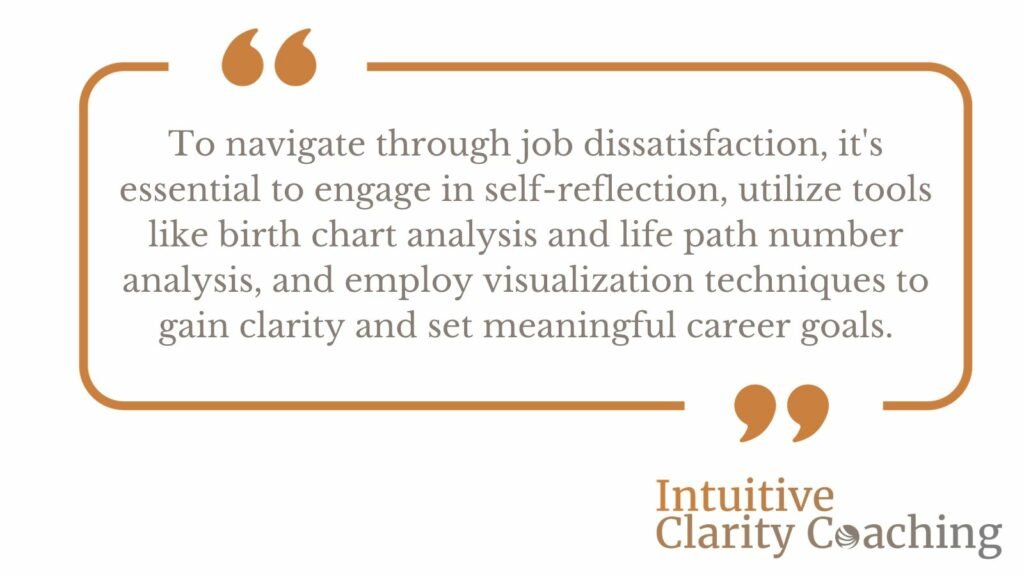In today’s fast-paced and ever-evolving work environment, job dissatisfaction has emerged as a critical issue affecting not only individual employees but also the broader health of organizations. This phenomenon, often overshadowed by the pursuit of career advancement and success, holds significant implications for mental health and workplace dynamics. As Lena, the founder of Intuitive Clarity Coaching, with a rich background in life coaching and psychology, I bring a unique perspective to this topic, integrating traditional career guidance with spiritual approaches.
The purpose of this blog post is to delve into the nuances of job dissatisfaction, shedding light on its causes, the psychological impact it bears on employees, and effective strategies to overcome it. In my two decades of experience helping individuals align their careers with their life purpose, I have seen firsthand the myriad ways job dissatisfaction can manifest and the transformative power of addressing it.
Job dissatisfaction refers to a state where employees feel a lack of contentment and fulfillment in their roles. It encompasses a range of emotions and experiences, from feeling stagnant and unchallenged to harboring feelings of discontent and a desire to seek opportunities elsewhere.
In the following sections, we will explore the various facets of job dissatisfaction, including its common causes and psychological impacts, and offer practical solutions and strategies for individuals and organizations to effectively address and mitigate job dissatisfaction.

Understanding Job Dissatisfaction
Job dissatisfaction is a complex and multifaceted issue that can arise from various sources in the professional environment. At its core, it represents a state where employees feel a lack of contentment, fulfillment, and engagement in their roles. This feeling can stem from a myriad of factors ranging from personal aspirations to workplace dynamics.
Common Causes of Job Dissatisfaction
- Lack of Growth: A significant cause of job dissatisfaction is the feeling of stagnation or lack of advancement in one’s career. When employees feel that they are not learning, growing, or being effectively utilized, it can lead to a sense of discouragement and apathy.
- Poor Leadership: The quality of leadership and management within an organization plays a crucial role in employee satisfaction. Controlling or unyielding managers can create a stressful and unfulfilling work environment, leading to feelings of helplessness and dissatisfaction.
- Burnout: Excessive workloads, emotionally taxing tasks, and long hours can lead to burnout. This state of physical and emotional exhaustion significantly contributes to job dissatisfaction, affecting both personal well-being and professional performance.
- Company Culture: The culture of a company, including its values, norms, and practices, can greatly impact employee satisfaction. A toxic or unsupportive work environment can make employees feel unsafe and unvalued, contributing to their dissatisfaction.
- Work-Life Balance: The inability to maintain a healthy balance between work and personal life can lead to dissatisfaction. When work dominates one’s time and energy, it can leave little room for personal growth and relaxation, essential components of a fulfilling life.
- Personal Expectations: It’s important to recognize that personal expectations also play a role in job dissatisfaction. Employees often have a vision of what their job should offer them, such as opportunities for growth, recognition, and alignment with personal values. When these expectations are not met, it can lead to feelings of disappointment and frustration.
Psychological Impact of Job Dissatisfaction
The effects of job dissatisfaction extend far beyond the boundaries of the workplace, deeply influencing the mental and emotional well-being of individuals.
Mental and Emotional Strain
- Stress: Job dissatisfaction is a key contributor to work-related stress. Employees who are consistently unhappy in their roles often experience high levels of stress. This state of physical and emotional exhaustion can have serious implications for mental health, including increased risk of depression.
- Feelings of Powerlessness and Lack of Fulfillment: Prolonged dissatisfaction can lead to feelings of powerlessness and a sense of futility in one’s role. This can result in a decreased sense of personal achievement and lack of fulfillment, which are critical components of mental well-being.
- Impacts on Personal Life: The stress and negative emotions stemming from job dissatisfaction often spill over into personal life, affecting relationships, personal happiness, and overall life satisfaction.
Physical Health Concerns
Job dissatisfaction can also manifest physically. Chronic stress and unhappiness at work can lead to a variety of health issues, such as headaches, stomach problems, and exacerbated chronic conditions. The strain can weaken the immune system, making one more susceptible to illnesses.

Personal Strategies for Overcoming Job Dissatisfaction
Tackling job dissatisfaction often begins with a journey inward, exploring personal values, aspirations, and the alignment of your career with your life’s purpose. Here are some individual-centered strategies to help overcome job dissatisfaction:
In-depth Self-Reflection
- Understanding Personal Astrology and Numerology: Utilize tools like birth chart analysis and life path number analysis to gain deeper insights into your personal traits, strengths, and potential life paths. These tools can provide clarity on how your personal attributes align with your career, helping you understand whether your current job resonates with your innate disposition and life’s purpose.
- Visualization for Clarity and Goal Setting: Visualization is a powerful tool for manifesting career aspirations and addressing dissatisfaction. Imagine your ideal career scenario, the environment, the kind of work you’re doing, and how you feel in this role. This practice can help crystallize your goals and guide you towards a career path that is more fulfilling and aligned with your inner self.
- Assessing Career Alignment: Reflect on whether your current job aligns with your personal values and long-term goals. Are you able to utilize your skills and talents? Does your job give you a sense of purpose? Answering these questions can help identify the root causes of your dissatisfaction.
Seeking Support and Guidance
- Engaging with a Career Coach: Consider working with a career coach who can provide personalized guidance and support. As a spiritual career coach, I specialize in integrating traditional career advice with spiritual practices, offering a unique perspective on finding career clarity and alignment.
- Engaging with Group Career Coaching: A valuable resource in building your support network is participating in group career coaching sessions. I invite you to join our subreddit for group career coaching, where you can connect with individuals who share similar career aspirations and challenges. This platform offers a supportive community environment where members can exchange ideas, experiences, and advice. It’s an excellent space for gaining insights from diverse perspectives and feeling part of a community that understands your career journey.
- Leveraging Personal Connections: Beyond online communities, don’t overlook the power of your existing network. Reach out to mentors, colleagues, and friends who can provide guidance and support. These personal connections can offer practical advice, encouragement, and a sense of camaraderie as you navigate through your career path.
Remember, building a strong support network is crucial in overcoming job dissatisfaction. It provides you with a sense of belonging and a pool of resources to draw upon as you seek to align your career with your personal goals and values. Whether through our subreddit or your personal connections, engaging with others can be a transformative step in your career journey.
Balancing Work and Personal Life
- Pursuing Activities Outside of Work: Engage in hobbies, interests, and activities that bring joy and relaxation. These pursuits can help balance the stress of work and contribute to overall well-being.
- Practicing Mindfulness and Relaxation Techniques: Incorporate mindfulness practices, such as meditation and deep breathing exercises, into your daily routine. These practices can help manage stress and foster a sense of inner peace and clarity.
Navigating Towards Career Fulfillment
In this exploration of job dissatisfaction, we’ve delved into its causes, the profound psychological impact it has on individuals, and the strategies to overcome it. From the lack of growth opportunities and poor leadership to the imbalance in work-life dynamics, job dissatisfaction can stem from a multitude of factors. Its effects extend beyond the workplace, impacting mental health, personal well-being, and overall life satisfaction.
To navigate through job dissatisfaction, it’s essential to engage in self-reflection, utilize tools like birth chart analysis and life path number analysis, and employ visualization techniques to gain clarity and set meaningful career goals. Building a support network, including participating in our group career coaching subreddit, can provide the encouragement and perspective needed to make positive changes.
Overcoming job dissatisfaction is a journey towards self-discovery and personal growth. It’s about aligning your work with your life purpose and finding fulfillment in what you do. Whether you’re an individual seeking a more satisfying career path or an employer looking to create a more positive work environment, the steps outlined in this blog can guide you towards a more fulfilling and purposeful work life.
Thank you for joining me on this insightful journey. If you’re looking for more personalized guidance, don’t hesitate to reach out or join our supportive community on the subreddit. Together, we can embark on a path to not just build a career, but to create a life of fulfillment and alignment with your true self.
References:
- AIHR (www.aihr.com): Article on “8 Causes of Job Dissatisfaction & How to Combat It”.
- Eddy (eddy.com): Article on “Job Dissatisfaction: Causes & How To Address It in 2023″.
- Mayo Clinic (www.mayoclinic.org): Article on “Job burnout: How to spot it and take action”.






